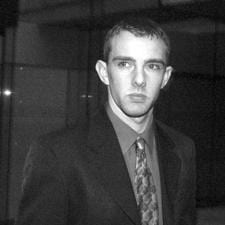The father of the only adult convicted of beating Aaron Webster to death in Stanley Park in November 2001 says he doesn’t know when or if his son will participate in a restorative justice program with Webster’s family.
Robert Cran says son Ryan just wants to be left alone for a while.
“It’s going to take Ryan a while to get back into society,” Robert says. “He knows he did something wrong.”
“We’re all sorry for what happened, especially for the Webster family and their loss,” Robert Cran says. “I’d be upset if I lost my son that way, but there’s nothing I can do.
“He just wants to get on with his life.”
Webster’s cousin, Denise Norman, says while the two youths convicted in the case were mandated to meet with the family to discuss their actions, Ryan Cran, 26, is not obligated to do so.
So far only one of the two youths has actually met with the community.
“The people who go and organize it said they talked to the police and then they talked to Cran, and apparently he’s not up for it,” Norman says.
“Why do they get to choose?” she asks. “It’s not a go. He’s not taking any responsibility.”
On its website, The Correctional Service of Canada defines restorative justice as “a non-adversarial, non-retributive approach to justice that emphasizes healing in victims, meaningful accountability of offenders, and the involvement of citizens in creating healthier, safer communities.”
Correctional Service of Canada spokesperson Alain Charette says Cran is entitled to slow the voluntary process down.
“Ryan is still very bitter,” his father says. “It’s a sad situation.”
Ryan is also bitter about having to serve a longer sentence than the two youths who pleaded guilty to killing Webster, his father says.
Cran was sentenced in adult court to six years in jail for his role in Webster’s death.
The youths, who were under 18 at the time of the attack, pleaded guilty to manslaughter in youth court and were sentenced to three years each — two years in jail and one year of house arrest.
“These assholes that did kill him got off with two years,” Robert Cran says. “That hurt Ryan.
“He stood behind them, not turning them into the police. You don’t turn your friends in,” Robert Cran says.
He says his son has been made a scapegoat in the killing.
In convicting Cran, BC Supreme Court Justice Mary Humphries noted that it was one of the youths that likely struck the death blow.
“There is no evidence to suggest Mr Cran delivered the fatal blow, and there is some evidence that Mr Cran stopped before others did,” Humphries wrote in her December 2004 decision.
Service regulations prohibit Charette from discussing the details of Cran’s case.
But how one participates in the program, which is handled outside the correctional service jurisdiction, has no impact on their correctional plan, he says.
Cran’s six-year sentence made him eligible for statutory release on parole Feb 7, after serving two-thirds of his sentence in prison, the National Parole Board confirms.
Cran’s unwillingness to engage in restorative justice just prolongs the pain for Webster’s family and the community, says Norman.
She says Cran’s family must bear some responsibility for the situation, too.
She alleges the Cran family has threatened to sue Vancouver police for the murder investigation.
Robert Cran just sighs. “I’m tired of her,” he says, adding that the whole ordeal has torn his family apart too.
Charette says both sides must be ready to engage in the non-confrontational, mediator-driven restorative justice process or its usefulness is diminished.
“People are totally entitled to slow the process down, take time and restore,” Charette says. “It’s a difficult process.”
Norman maintains it would be valuable for Cran to meet with people from the queer community to understand the impacts of his actions there.
“I don’t think he’s ever going to accept responsibility, and that’s step one in restorative justice,” says Little Sister’s co-owner and gay activist Jim Deva says.
Vancouver-Burrard MLA Spencer Herbert calls Cran’s reticence disappointing.
He says engaging in the restorative justice program would help the healing.
“We’ve never seen any remorse or acknowledgement [from Cran] of how horrible this crime really was,” Herbert says. “It’s a sad, sad case.”
Robert Cran rejects the notion that his son is homophobic.
He says the family was close with a gay couple who lived next door to them.
“Ryan would mow their grass. I would help them with their cars,” Robert Cran says.
“He doesn’t hate gays,” he says. “It’s not that way at all.”
“He made a mistake one night with a couple of asshole kids,” he adds, saying his son was easily led by the youths.
In convicting Cran, Humphries found that Cran drove the car that night and supplied the weapons.
While on parole, Cran must receive counselling for personal issues, avoid people involved in criminal activity, have no contact with Webster’s family and abstain from alcohol.
“You have been vulnerable to the negative influence of others,” the board noted in its report.
Cran was released from Matsqui prison in BC’s Fraser Valley and was to report immediately to a parole supervisor in New Westminster.
He must continue reporting until his full sentence expires on Feb 7, 2011, the board decision says.

 Why you can trust Xtra
Why you can trust Xtra


